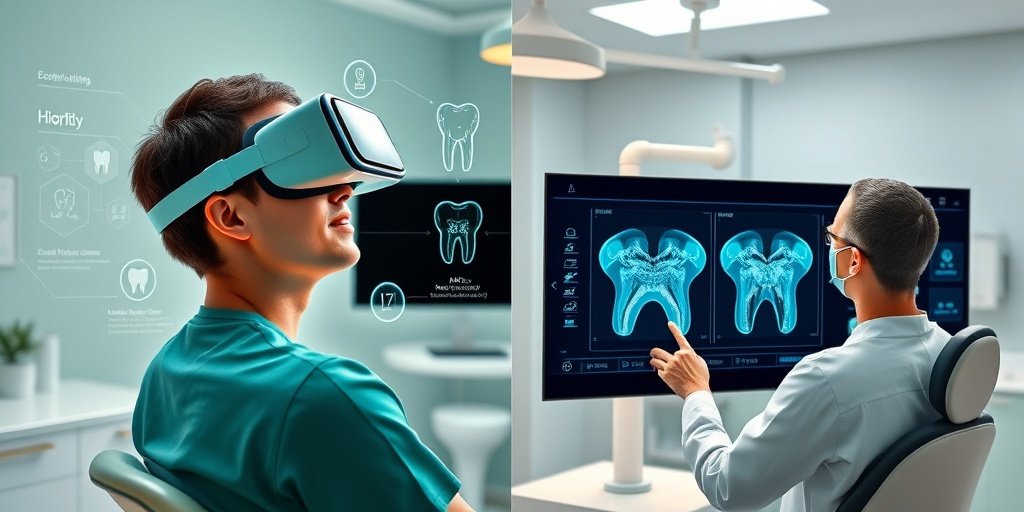⚡ Quick Summary
This article examines how artificial intelligence (AI) is reshaping endodontic education and practice, emphasizing the use of advanced technologies like machine learning and virtual reality to enhance diagnostic accuracy and procedural skills. The findings suggest that AI-driven approaches can significantly improve training outcomes for dental professionals.
🔍 Key Details
- 📊 Focus: AI in endodontic education and clinical practice
- ⚙️ Technologies: Machine learning, neural networks, computer vision, virtual reality, augmented reality
- 📈 Benefits: Enhanced diagnostic accuracy, procedural skills, personalized learning
- 🛠️ Challenges: Ethical considerations, data privacy, interdisciplinary collaboration
🔑 Key Takeaways
- 🤖 AI tools are transforming traditional training methods in dentistry.
- 💡 AI-driven approaches provide standardized assessments and real-time feedback.
- 🌐 Immersive simulations enhance the learning experience for dental students.
- 📚 Case studies demonstrate the effectiveness of AI in clinical training.
- 🔍 Ethical considerations must be addressed as AI becomes more integrated into education.
- 👥 Collaboration between disciplines is essential for successful AI implementation.
- 🏆 AI complements clinical expertise rather than replacing it.

📚 Background
The field of endodontics has traditionally relied on lectures and limited hands-on practice for training dental professionals. However, as technology advances, there is a growing need to incorporate artificial intelligence into educational frameworks. AI offers innovative solutions that can enhance learning outcomes and better prepare students for real-world clinical scenarios.
🗒️ Study
The article presents a comprehensive overview of how AI technologies, including machine learning and virtual reality, are being integrated into endodontic education. Through various case studies and pilot programs, the authors illustrate the potential of these tools to improve diagnostic skills and procedural techniques among dental students.
📈 Results
The findings indicate that AI-driven educational tools can lead to improved diagnostic accuracy and enhanced procedural skills. Students using AI technologies reported higher levels of engagement and satisfaction, suggesting that these tools can create a more effective learning environment.
🌍 Impact and Implications
The integration of AI in endodontic education has the potential to revolutionize how dental professionals are trained. By providing personalized learning experiences and real-time feedback, AI can help bridge the gap between theoretical knowledge and practical application. This shift could lead to better patient outcomes and a more competent workforce in the dental field.
🔮 Conclusion
This article highlights the transformative potential of artificial intelligence in endodontic education. As AI technologies continue to evolve, they promise to enhance training methodologies, improve diagnostic capabilities, and ultimately lead to better patient care. The future of dental education looks promising with the integration of these innovative tools!
💬 Your comments
What are your thoughts on the role of AI in dental education? We would love to hear your insights! 💬 Share your comments below or connect with us on social media:
Shaping the Clinician II: Artificial Intelligence-Taught Endodontic Skills.
Abstract
This article explores how artificial intelligence (AI) is transforming endodontic education and clinical practice. It highlights the impact of AI tools-such as machine learning, neural networks, computer vision, virtual reality, and augmented reality-in enhancing diagnostic accuracy, procedural skills, and personalized learning. Traditional training methods relying on lectures and limited hands-on practice are contrasted with AI-driven approaches offering standardized assessment, real-time feedback, and immersive simulations. The article addresses challenges related to ethical considerations, data privacy, and interdisciplinary collaboration. Through case studies and pilot programs, it demonstrates how AI can complement clinical expertise and revolutionize the training of dental professionals.
Author: [‘Chatha NR’, ‘Iqbal K’, ‘Zaman F’, ‘Hebert K’]
Journal: Dent Clin North Am
Citation: Chatha NR, et al. Shaping the Clinician II: Artificial Intelligence-Taught Endodontic Skills. Shaping the Clinician II: Artificial Intelligence-Taught Endodontic Skills. 2025; 69:585-602. doi: 10.1016/j.cden.2025.05.011